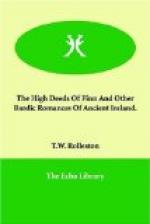On that, mac Datho rose up and shook himself, and called for food and drink, and made merry with himself and his guests. Then he sent privately for the messenger of Queen Maev, and said to him, “Long have I doubted what to do, but now I am resolved to give the hound to Connacht. Let ye send for it on such a day with a train of your nobles or warriors and bear him forth nobly and proudly, for he is worth it; and ye shall all have drink and food and royal entertainment in my Dun.” So the messenger departed, well pleased.
To the Ulster messenger mac Datho said, “After much perplexity I have resolved to give my hound to Conor. Let the best of the Ulstermen come to fetch him, and they shall be welcomed and entertained as is fitting.” And for these he named the same day as he had done for the embassy from Connacht.
When the appointed day came round, the flower of the fighting men of two provinces of Ireland were assembled before the Dun of the son of Datho, and there were also Conor, King of Ulster, and Ailill, the husband of Maev, Queen of Connacht. Mac Datho went forth to meet them. “Welcome, warriors,” he said to them, “albeit for two armies at once we were not prepared.” Then he bade them into the Dun, and in the great hall they sat down. Now in this hall there were seven doors, and between every two doors were benches for fifty men. Not as friends bidden to a feast did the men of Ulster and of Connacht look upon one another, since for three hundred years the provinces had ever been at war.
“Let the great boar be killed,” said mac Datho, and it was done. For seven years had that boar been nourished on the milk of fifty cows; yet rather on venom should it have been nourished, such was the mischief that was to come from the carving of it.
When the boar was roasted it was brought in, and many other kinds of food as side dishes, “and if more be wanting to the feast,” said mac Datho, “it shall be slain for you before the morning.”
“The boar is good,” said Conor.
“It is a fine boar,” said Ailill; “and now, O mac Datho, how shall it be divided among us?”
There was among the Ulster company one Bricru, son of Carbad, whose delight was in biting speeches and in fomenting strife, though he himself was never known to draw sword in any quarrel. He now spoke from his couch in answer to Ailill:
“How should the boar be divided, O son of Datho, except by appointing to carve it him who is best in deeds of arms? Here be all the valiant men of Ireland assembled; have none of us hit each other a blow on the nose ere now?”
“Good,” said Ailill, “so let it be done.”
“We also agree,” said Conor; “there are plenty of our lads in the house that have many a time gone round the border of the Provinces.”
“You will want them to-night, Conor,” said an old warrior from Conlad in the West. “They have often been seen on their backs on the roads of rushy Dedah, and many a fat steer have they left with me.”




